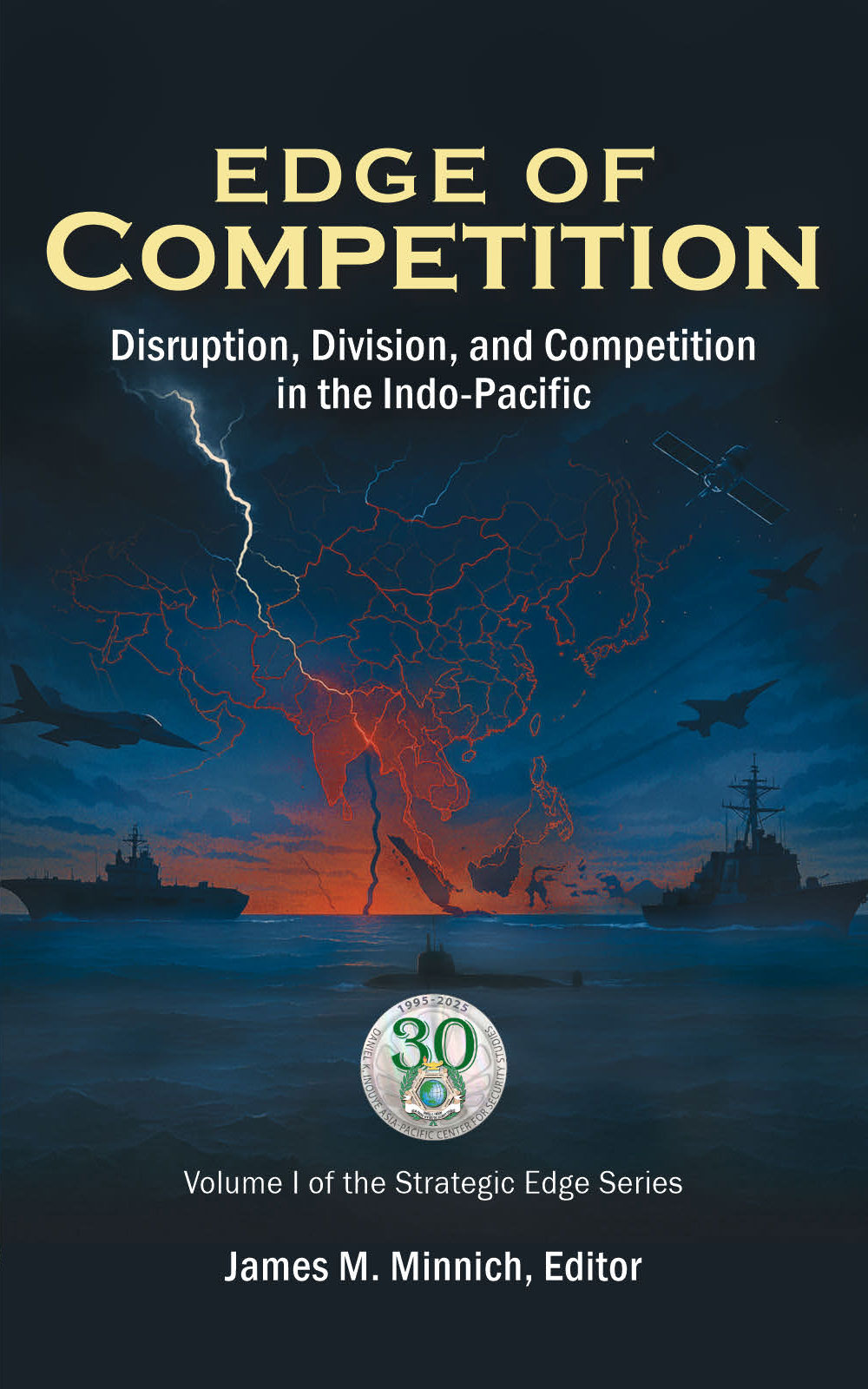Preface
The defining feature of the Indo-Pacific is its state of constant, accelerating change. But this volatility is not random. It is driven by three converging forces: strategic shocks that disrupt familiar patterns, political divisions that fragment authority, and daily contests that intensify competition across every domain.
As we mark the 30th anniversary of the Daniel K. Inouye Asia-Pacific Center for Security Studies, these forces lie at the heart of our work. When The Indo-Pacific Mosaic appeared in January 2025, it offered a sweeping overview of the region. Readers valued its breadth, but many called for a sharper, more focused lens on the region’s most volatile pressure points.
Edge of Competition is our answer. The first volume in the new Strategic Edge Series, this book zeroes in on the friction zones where regional stability is being contested—and where the future will be shaped.
Mapping the Edges
The volume begins with my framing chapter, Edges of Instability, which introduces the regional conditions that define this moment. From there, the book unfolds across three thematic parts:
Part I | Disruption – Catalytic shocks to the regional order.
- Disruptive Risks of Globalization– Dr. Sebastian Kevany explores the destabilizing effects of interconnected systems.
- Peak China? – Colonel Ryan C. Agee examines whether China is reaching the limits of its strategic ascent.
- China’s Reusable Rocket Surge – Elliot Joseph Fox analyzes the implications of Beijing’s progress in space launch technology.
- Terrorism after the Caliphate – Dr. Sam Mullins assesses how violent extremism is evolving in the Indo-Pacific.
- China’s Nuclear Rise – Dr. Bill Wieninger evaluates the strategic consequences of China’s expanding arsenal.
Part II | Division – Fragmented legitimacy, contested authority, and shifting alignments.
- Myanmar on the Edge – Dr. Miemie Winn Byrd spotlights Myanmar as a persistent blind spot in regional strategy.
- India’s Strategic Ascent and South Asia’s Strategic Edge – Shyam Tekwani and Saumya Sampath offer a dual analysis: India’s leadership role and the strategic agency of smaller South Asian powers.
- ASEAN Leadership in Flux – Dr. Scott D. McDonald examines ASEAN’s internal fractures and path to strategic relevance.
- Pacific Small States, Big Stakes – Dr. Kevin D. Stringer and Madison Urban highlight how Indo-Pacific microstates leverage strategic agency amid competition.
- Korea’s Strategic Clarity – Dr. Lami Kim argues that South Korea’s era of strategic ambiguity has ended, and clarity is now essential.
Part III | Competition – Daily arenas of strategic maneuver and contestation.
- Contesting the South China Sea – Dr. Denny Roy evaluates regional responses to Chinese maritime coercion.
- Safeguarding India’s Submarine Cables – Divya Rai examines critical vulnerabilities in undersea digital infrastructure.
- Dissuading Sea Slavery – Anny Barlow proposes a new model to counter forced labor in the fishing industry.
- Battlerace for Industrial Power – Dr. Srini Sitaraman analyzes the intensifying contest for industrial and technological dominance.
This volume culminates in my afterword, The Edge of Advantage, which synthesizes these diverse challenges into three guiding principles for strategic action.
Looking Ahead: From Diagnosis to Prescription
Edge of Competition diagnoses the most pressing dynamics shaping the Indo-Pacific. Its companion volume, America’s Strategic Edge, will move from diagnosis to prescription, examining how the United States can sustain its pivotal regional role through refined deterrence, readiness for high-end conflict, and a renewed warrior ethos.
Future volumes in the Strategic Edge Series will adapt as the environment demands. But each will share a clear aim: to provide sharp analysis, strategic foresight, and actionable insight for navigating the Indo-Pacific’s evolving security landscape.
A Word of Thanks
This volume would not exist without the intellectual rigor of our contributing authors and the steadfast support of the DKI APCSS community. For three decades, they have advanced a free, open, and resilient Indo-Pacific. I am deeply grateful for their scholarship, service, and example.
May the pages that follow offer clarity, challenge assumptions, and help turn insight into action.
Dr. James M. Minnich
Colonel, U.S. Army (Ret.)
Honolulu, Hawai’i | June 25, 2025






